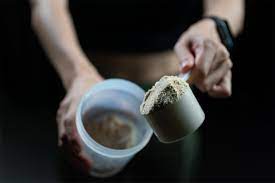The Science of Protein: Determining Optimal Intake for Athletes

Protein is often hailed as the building block of muscle, making it a crucial component of an athlete’s diet. But just how much protein do athletes really need to reach their peak performance? In this article, we’ll delve into the science behind protein requirements for athletes and uncover the optimal intake levels. Let’s explore the connection between protein and sports nutrition.
Protein’s Role in Athletic Performance
Protein is vital for athletes as it plays multiple crucial roles in the body. First and foremost, it aids in muscle repair and growth. When you engage in strenuous physical activities, your muscles experience micro-tears, and protein helps in repairing and strengthening them. Additionally, protein supports the production of enzymes and hormones that regulate various physiological processes in the body.
Understanding Protein Needs
The Recommended Dietary Allowance (RDA) for protein intake is 0.8 grams of protein per kilogram of body weight for sedentary adults. However, athletes have significantly higher protein requirements due to their increased muscle turnover and energy expenditure. The optimal protein intake for athletes depends on various factors, including the type of sport, intensity, duration, and individual goals.
For endurance athletes such as long-distance runners or cyclists, protein needs may range from 1.2 to 1.4 grams of protein per kilogram of body weight per day. On the other hand, strength and power athletes, like weightlifters or sprinters, may require a higher intake, ranging from 1.4 to 2.0 grams per kilogram.
Timing Matters
Incorporating protein into your diet at the right times can also influence its effectiveness in aiding athletic performance. Consuming protein both before and after exercise can be beneficial. Pre-workout protein helps with muscle protein synthesis, while post-workout protein aids in recovery and muscle repair.
Quality Over Quantity
While determining protein needs is important, the quality of protein sources is equally crucial. Athletes should focus on lean sources of protein such as lean meats, poultry, fish, eggs, dairy, legumes, and plant-based options like tofu and tempeh. These sources provide essential amino acids required for muscle protein synthesis.
Avoid Overdoing It
While protein is essential, excessive protein intake can have adverse effects, including dehydration and kidney strain. Athletes should aim for a balanced diet that includes carbohydrates and fats alongside protein.
In the world of sports nutrition, protein is undeniably a critical element. However, there is no one-size-fits-all answer to how much protein an athlete needs. The optimal protein intake depends on various factors, including the type of sport, training intensity, and individual goals.
To maximize athletic performance, it’s essential to tailor your protein intake to your specific needs and goals. Incorporating the right amount of protein into your diet, along with a balanced intake of carbohydrates and fats, can help you reach your peak performance and achieve your sports nutrition goals.
Remember, the key to success in sports nutrition is finding the perfect balance that works for your body and your sport.
For more insights on sports nutrition and other related topics, stay tuned to our forum.






